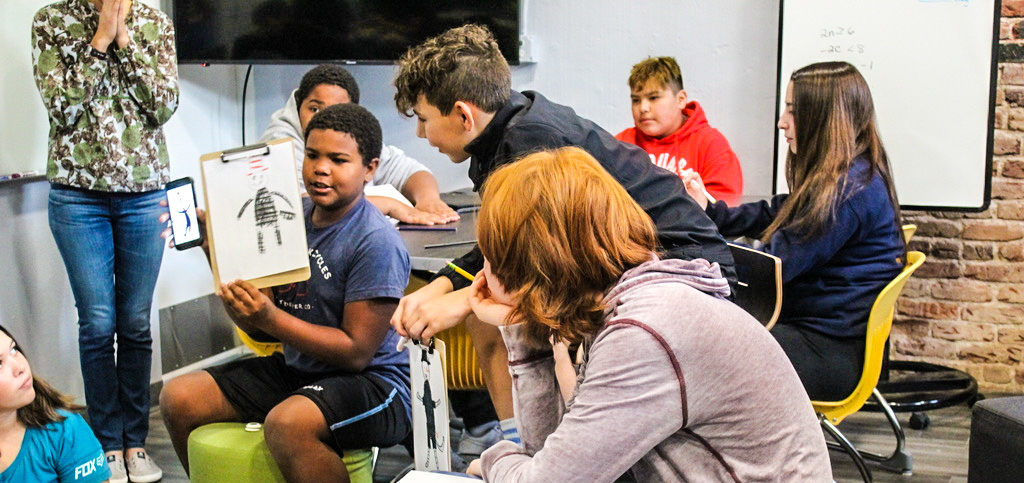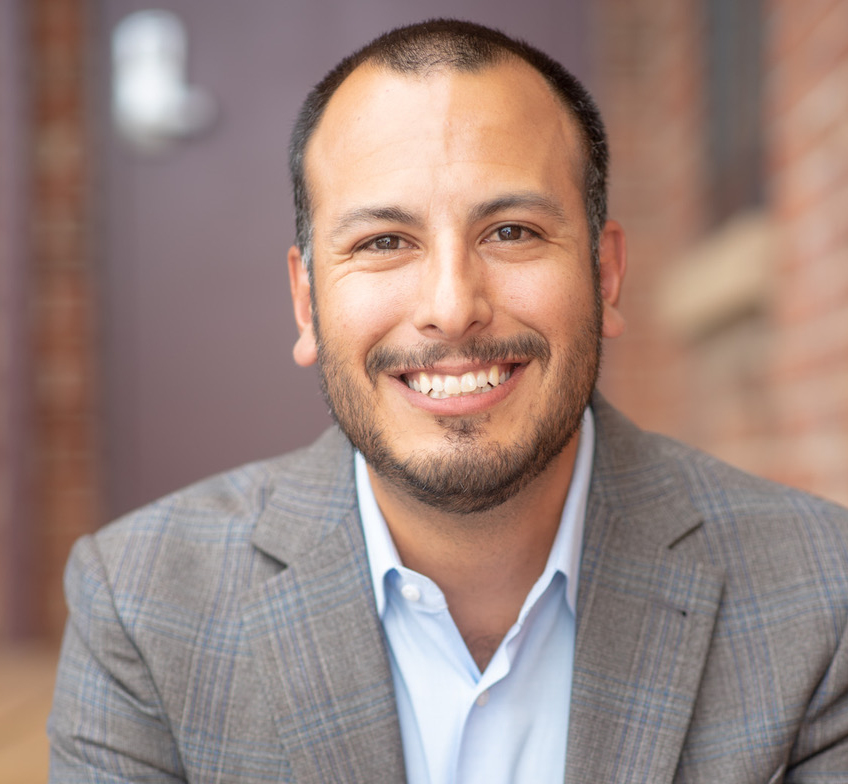How do we build community? We build it together.
Miguel Gonzalez, Director of School
Q: What path led you to your work at Embark Education?
Miguel: I grew up in Colorado and began my path as an educator at a very conventional middle school. After the first couple of years, I was fortunate to move to Costa Rica where I taught at and led an international school. My experience in Costa Rica transformed how I thought about education—understanding the value of community-focused learning. Being in a smaller school led me to build stronger, more personal relationships with my students and families and see and engage with them all as whole human beings.
While it wasn’t necessarily a learner-centered school, I ran my classroom in a learner-centered way. And, as I stepped into a leadership role, I supported others to do the same. When I came back to the U.S., I began working as an administrator in Denver Public Schools supporting leadership development. This role showed me the power of the public education system, but I knew that that wasn’t going to be the best place for me to be an effective educator.
I was able to step back and reflect upon my various experiences, understand what I really value in education, and where I would best fit moving forward. I sought out a small education community and became the middle school director of a local Montessori school. That’s where all the puzzle pieces really started coming together. Combining my experience with this learner-centered pedagogy and model with my previous education and community experiences, the opportunity with Embark Education was the natural next step.
For a lot of people, their transformational learning moment doesn’t happen within the education system. But, each and every time it does happen, it’s a time they were valued as learners and experienced a meaningful outcome.
Miguel Gonzalez, Director of School
Opening a learner-centered school that was designed from the ground up was an opportunity I couldn’t step away from. Before stepping into my role as Director of School at Embark, one of the most influential moments in my career came when I was challenged to think about a transformative learning experience that made me fall in love with learning. I thought back to a moment in high school when I was taking a theater tech program. I wasn’t a “theater kid” and when I made my parents attend the play I helped with, they couldn’t understand why. I wasn’t in the play, so why would they go?
I couldn’t really articulate why they should come either, other than the fact I had put forth true effort and learning into something that was meaningful to me. And that moment, looking back now as an educator, that moment shifted how I thought about teaching and learning. And, how I’m able to challenge those around me, even parents, to reflect upon what their transformative learning moment was. For a lot of people, their moment doesn’t happen within the education system. But, each and every time it does happen, it’s a time they were valued as learners and experienced a meaningful outcome.
Q: A big component of the Embark learning experience happens within a coffee shop and a bike shop. Can you explain how this works?
Miguel: The two businesses are called Pinwheel Coffee and Framework Cycles. Both shops and Embark are supported by Great Work, Inc.—a local non-profit dedicated to asking the simple but powerful question of “How can we human better?” The organization has traditionally worked in the Montessori world—providing AMI-partnered teacher training for Montessori teachers. As they expanded their work, they started Pinwheel Coffee as a real-world learning space in partnership with some local Montessori schools. Through that partnership, they received a lot of recognition and success.
They attempted to partner with a big public school but found it much more difficult due to the limitations of how long students could be in the shops. This learning moment put Pinwheel Coffee at a crossroads. Even though it was a successful coffee shop, it wasn’t meeting its goal of supporting student learning. Great Works had to assess whether they would double-down, bring in students of their own, and lean into creating truly learner-centered experiences—or operate within these limitations.
Together, we doubled down and opened Embark Education. When we did that, we knew we would need some additional space. And, that’s when we started really thinking about what another appropriate business for adolescent learning would be. We landed on the bike shop. Since then, we’ve discovered how both spaces are great gathering spots for community. And, how much the two communities often crossover. Providing these spaces where students can work with the community, engage in authentic interactions, and access a variety of skills is the kind of real-world learning we want for them. So, the two businesses literally exist for the purpose of the learning we provide at Embark Education.
Q: What does community mean to you? How do you go about creating that within your learning environment?
Miguel: I see community as concentric circles. At the most immediate level, there is a community within the families we serve. Then, there is community within classrooms or subjects. Then, there’s community within the entire school. Then, community within the neighborhood, within Denver, and so on and so forth. As we move out along those rings, we actually show up differently in each one of those communities. In a learner-centered environment, we strive to support students in understanding how they show up in each of those spaces.
At Embark, our students can unabashedly show up as middle schoolers. They show up fully and authentically as themselves. But, as they step into the coffee shop or bike shop, they will suddenly shift. You can see it in their posture. You can see it in their walk and their swagger. Because, they’re showing up in a different community. They’re showing up in one concentric circle larger than what has become familiar. Supporting them in stepping into those spaces with confidence, understanding who they are, and then allowing them to find success and failure in that community—followed by asking reflective questions about that experience—is what it’s all about. Then, when customers enter the door, and they’re challenged with interacting with them, their community circle expands again to the neighborhood level.
Circling back to the original question of how do we build community, we build it together. I talk about how I show up, they talk about how they show up. We talk about where we have been successful and where we’ve made mistakes, oftentimes within the same day. Together, we strengthen our communities. Middle schoolers are young adults. We treat them and respect them as adults and support them as young people.
Q: In your earlier teaching days, what did you feel limited by that you really wanted to possibly eliminate once you took on higher leadership positions?
Miguel: Oftentimes, the administrator or the school leader is seen as the authority and everything has to feed through them. In reality, it’s the educator who knows their students best. I definitely try to make sure I know all of my students as an administrator, but the relationship is different. An educator working directly with students should be honored as experts in decision making. I really strive to empower educators to see themselves as fully valuable professionals, and for them to see me as a thought partner and supporter, rather than the sole decision maker or a barrier.
Q: What’s a learning story from Embark that really captures what’s possible within this learning environment?
Miguel: We are fortunate enough to have a small backyard behind our businesses. When we initially started, the backyard was kind of messy, so as a community, we decided to revive it. After we cleaned things up, we went back there with the students and brainstormed what we wanted to do with the space. One student who’s particularly gifted in art proposed we paint a mural on one of the walls. We thought, “Fantastic!” But, she didn’t just want to do her own mural, she wanted to bring her peers into the activity. She held a contest to pull together ideas for the mural. And, as she was talking about it and planning it with two other students in our coffee shop, members of a local art collective were working inside the coffee shop that day and said, “Hey, are you guys talking about painting a mural? We would love to support this.”
That was the moment that student was empowered to make a connection to a bigger community than anything that she’d ever been a part of before. My role moving forward was to support the student in deepening this connection, supporting the group of students in sharing their design ideas with the art collective, and then, ultimately, supporting them in purchasing supplies and making the mural a reality.
But, each step of the way, it was making sure that it was the student taking action and making decisions. We can’t take away their power in that moment. It’s not about me or us adults. It’s always about the students. Finding their opportunity to learn and express their passion and doing it in a community setting has been incredible to see play out.
Q: What do you wish you were asked more often about the work happening at Embark Education?
Miguel: This question makes me think about fellow educators. It almost seems too simple of a request, but I wish we educators would ask more about how we can learn together. I’m really fortunate with Embark to be able to build it from the ground up with learner-centered learning in mind. But, that’s not the end goal. Making Embark the best it can be is not the end goal. We have learnings we can share and know there is much to learn from others.
We talk about ourselves like the trim tab on a big shipping vessel. These vessels are so large that the rudder is unable to turn the boat on its own. So, they attach a trim tab, which turns first. Then, the rudder turns and finally, the vessel turns. Thinking about our work in those terms makes us see Embark as the trim tab, fellow educators and learning environments as the rudder, and our collective learning—if we indeed collect it together—as the vessel. Embark is not perfect. We have a lot of learning, and we have a lot of things to share. It’s not about being learner-centered in isolation and yelling into the void. It’s about bringing this type of learning to every child in Denver and beyond.

